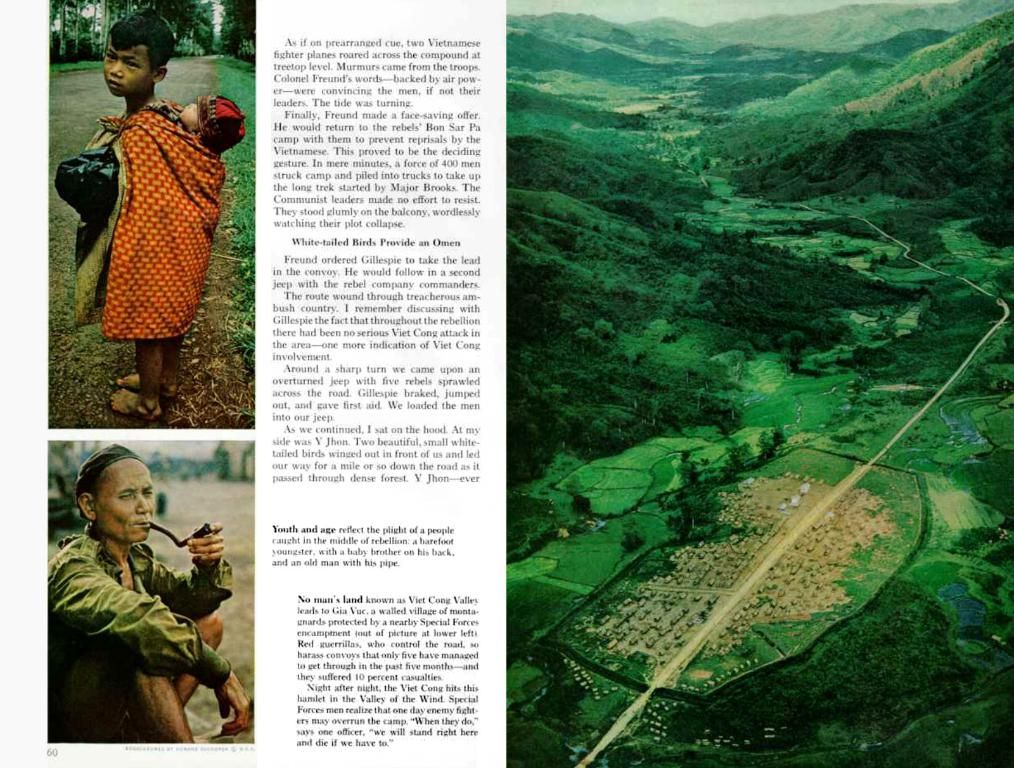Unleashing Macau's Potential Beyond Casinos: A Billion-Dollar Diversification Plan
Macau purposes to diminish gambling dependency
Looking to shake off its gambling-centric image, Macau's chief executive, Sam Hou Fai, has unveiled a series of four major infrastructure projects worth a staggering 4.2 billion EUR, aimed at reducing Macau's economic dependency on the lucrative casino sector. Here's a lowdown on these ambitious projects:
Diversifying Macau's Economy: More Than Just Casinos
With around 80% of its tax revenue coming from the gambling industry, Macau recognizes the structural risks associated with such a one-sided economy. To maintain its competitive edge and thrive in the face of growing gambling competition in Asia and international challenges like the trade war between China and the USA, the time has come to broaden horizons.
Welcome to the Special Administrative Region with Special Perks
Since its handover from Portugal in 1999, Macau has operated as a Special Administrative Region (SAR) of China, similar to Hong Kong. Benefits include its own legal system, currency (Pataca), independent customs and tax policy, and extensive economic and political autonomy. This unique status enables Macau to engage in international agreements, maintain an open economy, and serve as a bridge between China and the West within the Greater Bay Area, with special privileges like duty-free status as a free port and the unique regulations of the Hengqin cooperation zone.
Unveiling the Projects
Introduced at a media event, these projects are part of a long-term strategy for the promotion of "moderate economic diversification," aligned with the guidelines of Chinese President Xi Jinping. Here’s what to expect over the next eight to ten years:
University City Hengqin: Educating for a New Tomorrow
The largest project entails the development of the Macau-Hengqin International Education City, with nearly 200 billion MOP allocated for its construction. Expected to start operations in 2028, the new campus of the University of Macau will serve as its nucleus, with the University of Tourism expanding into this vibrant educational hub in a second phase. Located in the Hengqin cooperation zone, the complex aims to nurture highly skilled specialists for tourism, leisure, and international cooperation.
International Cultural and Tourism Quarter: The Heart of the West
Slated for construction on the land between the Macau Peninsula and Taipa, this quarter is planned to combine modern architecture with traditional Chinese culture. With a budget of 120 billion MOP, the district is set to be a cultural showcase, featuring a National Museum, an international center for performing arts, and a museum of modern art. The construction period is estimated to span two to three years, and the hope is for Macau to emerge as one of Asia's leading cultural hubs.
Airport Expansion and Logistics Hub: Flying High in Macau
The Macau International Airport will undergo a significant expansion, costing approximately 6.6 billion EUR. The updated airport infrastructure aims to make Macau an international aviation hub on the western bank of the Pearl River Delta, with over 50 international flight connections currently in place. This expansion involves land reclamation to expand the runway and increased cooperation with Zhuhai Jinwan Airport, focusing on logistics and transport solutions for cross-border e-commerce and the high-tech industry in the Greater Bay Area.
Technology Park: A Hub for Innovation and Research
Lastly, the planned Macau Technology R&D Industrial Park is set to become a magnet for research centers of international corporations, complete with customized infrastructures and funding mechanisms. The goal is to establish high-tech companies from home and abroad in Macau and integrate the research park into the Greater Bay Area network, positioning Macau as a platform for technological excellence.
Embracing the Future: The Power of Hengqin
To foster these projects' success, the revised legal regulations tailored to the Hengqin cooperation zone aim to provide investors with a higher degree of legal certainty, predictability, and stability. Currently, many companies registered in Hengqin have yet to start operations. With the formation of six interdisciplinary steering committees and working groups, Macau is committed to efficient project management to strengthen its connections with neighboring cities, promote real activities in Hengqin, and assume its role as a bridge between China and the West.
[1] Specifics about the four sectors under the "1+4" policy are not yet publicly disclosed.
[2] Increased funding for museums and art facilities will likely support Macau's objective of strengthening its cultural identity.
[3] Source: China Daily - Macau, mainland to deepen cooperation
[4] Source: Belt and Road Initiative - Guangdong-Macao In-depth Cooperation Zone in Hengqin
[5] Source: South China Morning Post - Macau has big plans to become a global technology and innovation hub
Online casinos in Germany might not be a part of Macau's diversification plan, but technology certainly is. The technology park project in Macau aims to become a magnet for research centers of international corporations, complete with customized infrastructures and funding mechanisms, positioning Macau as a platform for technological excellence. Furthermore, the Macau International Airport's expansion, part of the diversification plan, will also focus on logistics and transport solutions for cross-border e-commerce and the high-tech industry in the Greater Bay Area, demonstrating the importance of technology in Macau's future growth.






